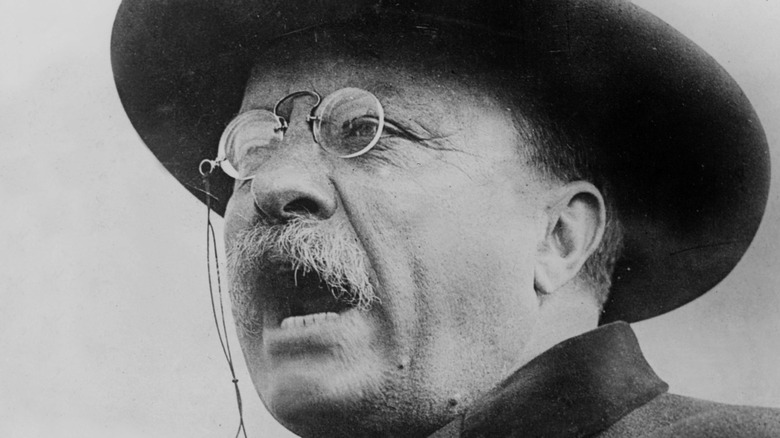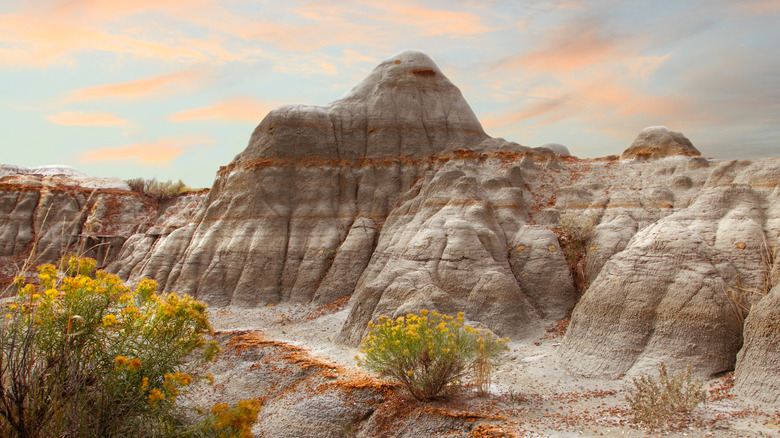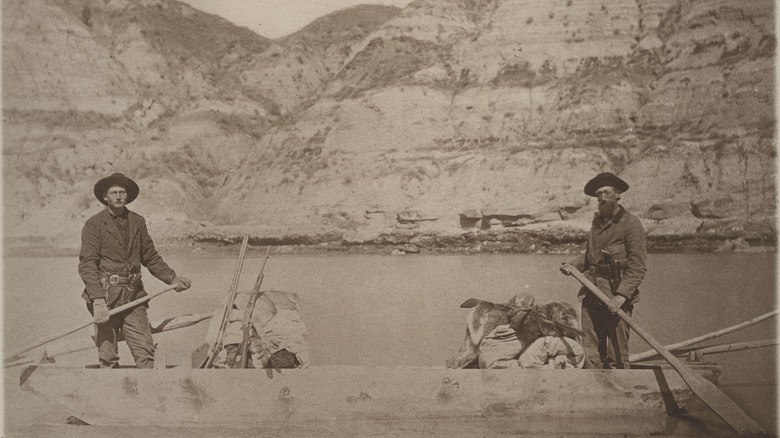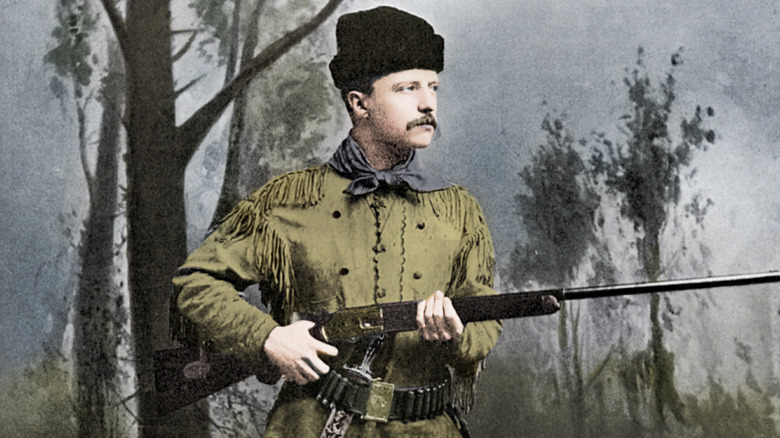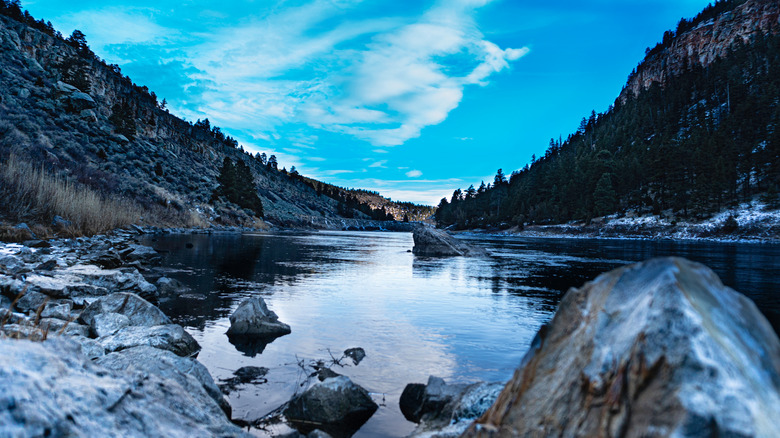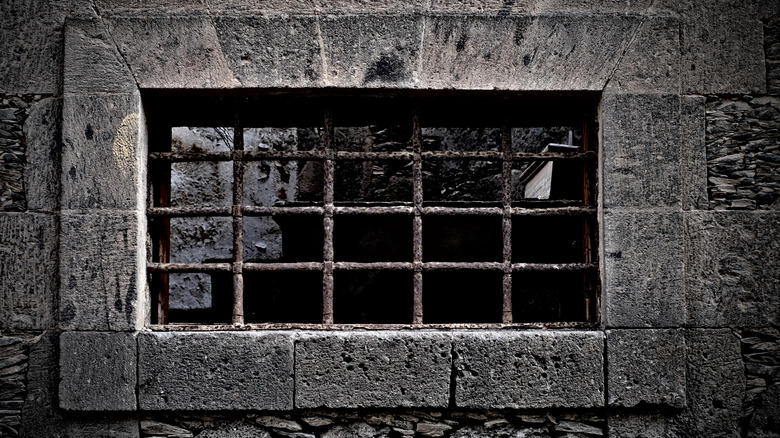Inside The Wild Story Of The Teddy Roosevelt Boat Thieves
Before Theodore "Teddy" Roosevelt became the 26th president of the United States, or fought In the Spanish-American War with his "Rough Riders," he spent time as a rancher out West. His many adventures included a rugged 300-mile journey to bring three bandits who'd stolen his boat to justice, according to the National Park Service.
In 1883, when he was 24 years old, Teddy Roosevelt headed for the Badlands of what was then known as the Dakota Territory to hunt buffalo, but quickly became infatuated with the country and impulsively invested in two ranches. After both his wife and mother died on Valentine's Day 1884, the former from kidney disease and the latter from typhoid fever, Roosevelt quit New York state politics and headed back to the Badlands, according to History. Besides the crushing heartbreak of losing them both, Roosevelt hoped to overcome his health problems, mainly asthma, and experience the frontier that was quickly disappearing, per the Theodore Roosevelt Center.
Cattle Killers and Horse Thieves
By early 1886, Teddy Roosevelt had settled into the life of a deputy sheriff and cowboy at his Elkhorn Ranch, near what is now Medora, North Dakota. One February morning, a ranch hand came running up to report that someone had stolen their one and only boat, per the 1920 biography "Theodore Roosevelt," by Edmund Lester Pearson. The boat was Roosevelt's only means of crossing the swollen Little Missouri River to look after their horses who were wintering on the opposite e bank.
Roosevelt had a pretty good idea who was behind the theft. There were three "hard characters" that "belonged to a class that always holds sway during the raw youth of a frontier community, and the putting down of which is the first step to decent government," according to Roosevelt's 1888 memoir, "Ranch Life and the Hunting-Trail." The men were living 20 miles upriver from Roosevelt's ranch. Their leader, Mike Finnigan, was a big man with shoulder-length red hair and a penchant for gun fights, according to Roosevelt, and the three were known as cattle killers and horse thieves. The bandits were looking to leave the area where a band of vigilantes known as "the stranglers" were busy hanging lawbreakers, especially horse thieves.
Roosevelt Pursues the Boat Thieves
The boat thieves had been smart since they took the only means of pursuit. It was February and chasing them overland would have been nearly impossible because of the winter weather and massive ice flows that littered the river bank. Two of Roosevelt's ranch hands, Wilmot Dow and William Sewall who were originally from Maine and skilled boat builders, threw together a flat-bottomed boat in three days, according to "Ranch Life and the Hunting-Trail."
Roosevelt was glad to have these men, who he called "quick as cats, strong as bears, and able to travel like bull moose." They packed flour, bacon, coffee, bedding, rifles, a shotgun, and mess kit into their new boat, and headed downriver in pursuit of the thieves. Yes, they now had a boat and could have just let the three men get away with their crime, but Roosevelt believed that "to submit tamely and meekly to theft ... is to invite almost certain repetition of the offense," he recalled in his memoir. Besides, he was a deputy sheriff and had a duty to catch criminals, especially those stealing from him.
A Surprise Attack
For three days, Roosevelt and his men pursued the thieves, braving bone-chilling weather, giant ice flows, a lack of fresh meat, and the possibility of being surprised by the men they were hunting. On the afternoon of the third day, coming around a bend, they spotted Roosevelt's stolen boat tied up on the riverbank next to another flat-bottomed boat, per the National Park Service. Roosevelt and his men quietly made their way toward the smoke from a campfire with their weapons at the ready. When they neared the camp, they saw that there was only one man there and his gun was at his feet. They quickly took him into custody without a fight and then waited for the other two thieves to return from hunting.
Roosevelt heard them coming from a long way off. They entered the camp, rifles over their shoulders, the steel barrels glinting in the sunlight, Roosevelt recalled in "Ranch Life and the Hunting-Trail." Roosevelt demanded that they put their hands up and while one man instantly obeyed, the leader, Finnigan, hesitated, as if thinking over his chances of shooting it out. Roosevelt, gun pointed at Finnigan's center, slowly walked towards him. The red-haired leader realized he'd been beaten, cursed, and threw down his rifle.
A Hard Journey
Now that Roosevelt had captured the boat thieves, he had to get them to a town that had a jail and that would prove to be harder than tracking down the criminals. They had to keep a perpetual guard of the prisoners, which meant that Roosevelt and his two men could only sleep in shifts. Additionally, Roosevelt believed that if they tied the prisoners up, it was so cold they could lose their hands and feet to frostbite, according to "Ranch Life and the Hunting-Trail." He took the first shift, trying to stay awake, his shotgun leveled on the men as they all huddled near the roaring campfire.
The next day, they journeyed downriver but soon ran into another problem. The river became choked with ice and impassable. For eight days they camped out waiting for the ice to thaw. "There is very little amusement in combining the functions of a sheriff with those of an arctic explorer," Roosevelt recalled in his memoirs. They were in Sioux country and the game was scarce. Soon they were reduced to eating unleavened bread. To pass the time, the men, including the prisoners, read. Roosevelt worked his way through Leo Tolstoy's "Anna Karenina," according to a letter he wrote his sister, collected in the book "Letters from Theodore Roosevelt to Anna Roosevelt Cowles, 1870-1918." The prisoners, who had a large stack of books with them, read about Jesse James, and novels about high society back East, according to Roosevelt's memoir.
Roosevelt Got His Boat, the Thieves Got Prison
They eventually reached a ranch where they were able to borrow a wagon and a driver. While Dow and Sewall continued downriver with the boats, Roosevelt took the prisoners to Dickinson, trudging through thick mud behind the wagon that carried the prisoners, he recalled in "Ranch Life and the Hunting-Trail." 300 miles from where Roosevelt began his adventure, he turned the men over to the sheriff and received $50 for bringing them in, about $1,500 in today's terms, per Prairie Public Broadcasting.
A court later sentenced Finnigan, the ringleader, along with another of the thieves, to 25 months in prison. The third man had his case dropped. Finnigan later wrote to Roosevelt from prison, telling him, "I have read a good many of your sketches of ranch life in the papers since I have been here, and they interested me deeply," and invited him to visit if he got the chance, according to Prairie Public Broadcasting. Teddy Roosevelt would soon go on to other adventures, including serving as the U.S. president from 1901 to 1909.
